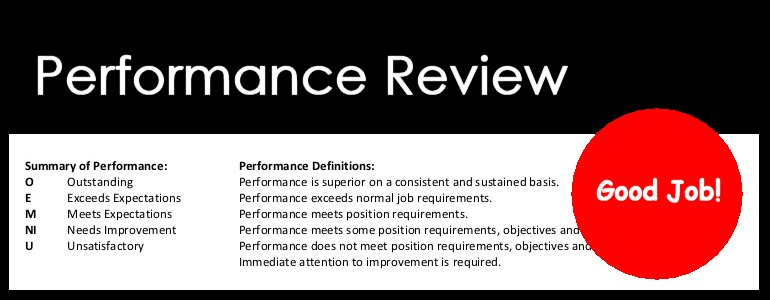
Don't let your performance review creep up on you!
We were asked by Balanced Life Magazine to provide some tips on how to get ahead in your performance review. This is what we said:
1. Request a job description
- An accurate and detailed job description provides you and your employer with a documented and stipulatory list of responsibilities you should be fulfilling and be evaluated on. It ensures that expectations from both parties are efficiently managed and agreed upon, therefore avoiding any misunderstandings, or unexpected surprises during the performance review!
- You should hopefully have received a detailed job description outlining the key performance areas of your role prior to accepting your position, but if you havenít received one or if your existing job description isnít an accurate account of what you do, it is imperative that you request one (or a revised one) prior to your performance appraisal.
- Discuss your job description and priority areas with your manager prior to the performance review and obtain a formal agreed job description to use as a common reference.
2. Focus on fulfilling every aspect of the job description
- Compare your current responsibilities with your job description. If you identify any aspects of the job description that you are not currently fulfilling at all or not fulfilling to the best of your ability, identify why, and how this can be remedied (if appropriate).
- Be proactive and identify ways in which to embrace your role more comprehensively.
- Obtain feedback on how youíre performing in relation to all expected performance criteria outlined in your job description throughout the year, so that you can instigate corrective action where necessary, thereby circumventing any unexpected criticisms during your review.
3. Do something extra
- Identify how you can make yourself an indispensable member of the team.
- Go the extra mile to assist team members or your line manager where you can for the good of the company as a whole e.g. pitching in after work or over a weekend to assist in meeting a critical deadline or dealing with a crisis.
- Also, if there are additional elements that you would like to include in your job description to progress your career in the right direction, identify how you can gain exposure and add value in this area.
- Act as a mentor and motivator to more junior staff members.
- Convey a positive and enthusiastic demeanour, thereby influencing the morale of those around you (youíll be remembered for it).
Don't by shy in rating your own performance
- Assess your own performance in relation to job responsibilities / key performance areas outlined in your job description.
- Donít be shy - identify your strength areas and achievements as well as improvements made since your last review and be prepared to be able to talk about these fluently during your review.
- Identify areas in the job description where you havenít performed well, and have a think about how this can be overcome e.g. through working with a mentor in the team, attending a training course or self-study, or being more proactive etc.
- Recognise the weaknesses in your personal attributes which are having a negative impact on your ability to do your work and identify how you can improve this e.g. if you clam up when talking to a group, you might benefit from some presentation training or a Toastmasters course.
- Have a think about any negative aspects that could be brought up in the review such as a conflict that could have been dealt with better. Be prepared to be able to talk about what you have learned from the experience in a positive way.
Prepare your speech!
- Ensure that you are well prepared for your performance appraisal. The better prepared you are, the less likely youíll react defensively when criticised or stumble over questions and the more productive the experience will be for both you and your line manager.
- You should be able to sell your strengths and achievements and speak about the value you have added to the team / organisation.
- You should be able to discuss your job role and how you would like to see this develop as well as discuss longer term goals for progression within the organisation and what you could be doing to bridge this gap e.g. taking on certain projects.
- Be prepared to discuss your skills and competencies and how these can be improved e.g. additional training.
- You will need to pre-empt criticisms and eloquently speak about improvements or proposed solutions to combat these.
- You should also be prepared to substantiate certain actions or speak about negative experiences and what you have learned from these.
- Be armed with suggestions as to how your line manager can assist you and / or your team in fulfilling your role/s more efficiently.
- Have questions prepared, prompting guidance from your line manager to facilitate a collaborative route forward.
Hope this helps. Good luck!
Author: Nike Wadds, Stand Tall Consulting
 CV Writing
CV Writing

